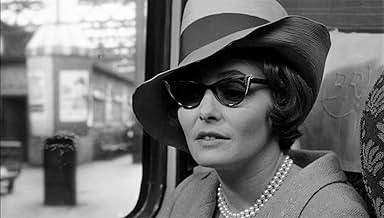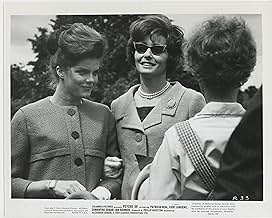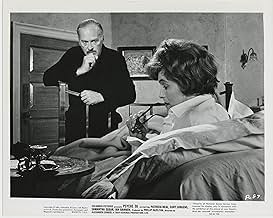Ajouter une intrigue dans votre langueIn London, the pregnant wife of an industrialist falls down the stairs, loses her sight and has no recollection of the events but suspects that a mentally traumatic experience prior to the f... Tout lireIn London, the pregnant wife of an industrialist falls down the stairs, loses her sight and has no recollection of the events but suspects that a mentally traumatic experience prior to the fall caused her accident.In London, the pregnant wife of an industrialist falls down the stairs, loses her sight and has no recollection of the events but suspects that a mentally traumatic experience prior to the fall caused her accident.
- Réalisation
- Scénario
- Casting principal
- Nomination aux 1 BAFTA Award
- 1 nomination au total
Curd Jürgens
- Eric Crawford
- (as Curt Jurgens)
Rex Garner
- Waiter
- (non crédité)
Pat Hagan
- Diner in Restaurant
- (non crédité)
Victor Hagan
- Diner in Restaurant
- (non crédité)
Aileen Lewis
- Lady in Teashop
- (non crédité)
Edward Malin
- Attendant in Men's Room
- (non crédité)
Jack Mandeville
- Man Exiting Lift
- (non crédité)
Louis Matto
- Waiter
- (non crédité)
Avis à la une
"Psyche '59" opened at an art theatre in New York City in 1964. Receiving lukewarm reviews, it closed quickly, and was then used as a co-feature in neighborhood theatres. I consider it a near-masterpiece. Starring Patricia Neal, Curt Jurgens, and Samantha Eggar, it is a spellbinding study of a woman suffering from hysterical blindness, her sex addict husband, and her younger sister, who it seems was sexually imposed-upon at a young age, and who is both cruelly nymphomaniacal and masochistic as a result. This film was clearly ahead of its time.
The screenplay by Julian Zimet, from a novel by Francoise des Ligneris, is a finely-nuanced piece of work.
Alexander Singer might be considered a great director of films about women's issues, as well as a great director of actresses. Consider his direction of Lola Albright in "A Cold Wind in August" three years before, and his direction of Lana Turner in "Love Has Many Faces" the year following. The fact that all three of these films were failures is clearly the reason why Singer is not widely known ("Love Has" having failed simply because its critics and audiences could not appreciate its deliberately melodramatic style).
The cinematography in "Psyche '59" is outstanding. One shot, in which the camera manages to look upward towards Samantha Eggar, while she is lying on the sand, took my breath away. Within the context of the scene, this use of strange camera angle was intensely effective, and not at all pretentious. Whether it was Singer's idea, or that of cinematographer Walter Lassally, I guess I'll never know.
The only flaw in "Psyche '59" is that the actress in the role of the grandmother seems too young for the part.
The screenplay by Julian Zimet, from a novel by Francoise des Ligneris, is a finely-nuanced piece of work.
Alexander Singer might be considered a great director of films about women's issues, as well as a great director of actresses. Consider his direction of Lola Albright in "A Cold Wind in August" three years before, and his direction of Lana Turner in "Love Has Many Faces" the year following. The fact that all three of these films were failures is clearly the reason why Singer is not widely known ("Love Has" having failed simply because its critics and audiences could not appreciate its deliberately melodramatic style).
The cinematography in "Psyche '59" is outstanding. One shot, in which the camera manages to look upward towards Samantha Eggar, while she is lying on the sand, took my breath away. Within the context of the scene, this use of strange camera angle was intensely effective, and not at all pretentious. Whether it was Singer's idea, or that of cinematographer Walter Lassally, I guess I'll never know.
The only flaw in "Psyche '59" is that the actress in the role of the grandmother seems too young for the part.
Obviously based on a novel (and on a novel by a woman too). I saw this film on TV forty years ago and remembered only the menacing conversation the heroine has with her mother, but that was sufficient to make me want to take another look at it again.
Having enjoyed enormous critical acclaim a couple of years earlier with 'A Cold Wind in August', Alexander Singer blew all the clout he'd gained with that freak success in this elaborate, breaktakingly pretentious folly about the love lives of the fabulously wealthy; and found himself condemned to spend the rest of his career in television. But 'Psyche 59' has awarded him the last laugh, it exists.
A weird hybrid of 'The Miracle Worker' and 'The Pumpkin Eater' (both of which ironically starred Anne Bancroft, who replaced Patricia Neal when she nearly died following a series of debilitating strokes while filming '7 Women' in 1965, barely a year after she'd won an Oscar for 'Hud'). Had Ms Neal died this film would probably be better remembered today, and it would certainly make it an even more vivid experience to watch than it already is. She wears a succession of fabulous outfits devised by Julie Harris plus a pair of those chic sunglasses that blind people always do in the movies, the photography by Walter Lassally is stunning, and the restless score by Kenneth V. Jones creates a similar mood to that his music lent soon afterwards to Roger Corman's 'The Tomb of Ligeia'.
Definitely a film to be watched at least once.
Having enjoyed enormous critical acclaim a couple of years earlier with 'A Cold Wind in August', Alexander Singer blew all the clout he'd gained with that freak success in this elaborate, breaktakingly pretentious folly about the love lives of the fabulously wealthy; and found himself condemned to spend the rest of his career in television. But 'Psyche 59' has awarded him the last laugh, it exists.
A weird hybrid of 'The Miracle Worker' and 'The Pumpkin Eater' (both of which ironically starred Anne Bancroft, who replaced Patricia Neal when she nearly died following a series of debilitating strokes while filming '7 Women' in 1965, barely a year after she'd won an Oscar for 'Hud'). Had Ms Neal died this film would probably be better remembered today, and it would certainly make it an even more vivid experience to watch than it already is. She wears a succession of fabulous outfits devised by Julie Harris plus a pair of those chic sunglasses that blind people always do in the movies, the photography by Walter Lassally is stunning, and the restless score by Kenneth V. Jones creates a similar mood to that his music lent soon afterwards to Roger Corman's 'The Tomb of Ligeia'.
Definitely a film to be watched at least once.
Françoise des Ligneris's novel "Psyche '59" becomes a fine dramatic vehicle for the always-sympathetic Patricia Neal, here playing the wife of a wealthy businessman who is suffering from 'hysterical blindness' after a mysterious fall; when sister Samantha Eggar comes to live with her after a failed attempt at marriage, years-old tensions (both resentful and sexual) between Eggar and brother-in-law Curt Jurgens rise to the surface. As photographed in glossy black-and-white by the esteemed Walter Lassally, the picture is a shiny, classy piece of goods, yet director Alexander Singer takes an awfully long time to warm up. The plot (or rather, the point inherent to the plot) doesn't make itself known for at least an hour into the proceedings, while the pretty images and visual tricks eventually become a nuisance. Singer doesn't appear to wrap things up cohesively with his finale, yet it's actually his best bit: Neal's mental handicap and Eggar's need to be the proverbial thorn in the rosebush are dealt with in solely visual terms, and the silent emotions released are triumphant. A near-miss, but worthwhile for fans of psychological melodramas verging on soap opera. **1/2 from ****
This film came on Turner Classic Movies recently, with the host mentioning that it was the film's debut on that channel, and the first film Patricia Neal made after winning the Oscar for Hud.
The story concerns a privileged upper-class blind woman named Alison (Neal), her husband Eric (Jurgens) and her younger sister, Robin (Eggar). At first all seems perfectly OK, given the circumstances, but bits of conversation are dropped here and there, darting looks are thrown here and there, and soon we realize that there is something lurking beneath the veneer of a privileged life. Alison, in the final stages of her second pregnancy, suffered a fall in her home that rendered her blind, though as she states early on, it's not that her corneas don't function, it's that her brain won't permit her to see images (paraphrasing here). Apparently this happened in 1959, hence the "'59" in the title: The story then takes place in 1964, five years after this fact, over a time period that seems to be about a month, or maybe two, when Robin re-arrives back into the lives of Eric and Alison after what appears to be a 5-year absence.
The black-and-white cinematography adds much to this film, such that I believe if it were in color, it would not be as effective. The language, dialogue and subject matter covered was ahead of its time, at least by U.S. standards, but stylistically, this matches a number of thrillers and socially-conscious dramas that came out of England in the early- to mid-1960s (e.g., Victim, Pumpkin Eater, etc.).
The first part of the film, set in London, sets up the story beautifully, and it isn't long before we start to realize that something's "up" - the carefully-worded dialogue, with certain key words and phrases omitted, or the glances of the blind Alison behind her sunglasses, to the beat of her words...you see that all that glitters is not gold, so to speak.
The second part of the film takes place at the characters' country house, located near a coastline; It is here that the set-up for what could be a riveting tale, as depicted in the first part of the film, loses steam and slows to a crawl, such that the conclusion is neither climactic nor satisfying; this is a shame, because it could have been done much better. Besides that, I do agree with the comments made by a previous observer, including that the grandmother doesn't seem quite grandmotherly (and actually, I'm sort of confused as to why this character is even in the picture).
Nonetheless, the acting is superb by all the leads, and particularly by Neal, who carries the film, in my opinion. Pay attention to every movement she makes, whether it's with her eyes, her head or her hands; listen intently to every syllable she utters, for it is through her character that we understand the real story of what has happened, or is happening, to these three people.
The movie is based on a book by the same name by Francoise des Ligneris, which is available online.
The story concerns a privileged upper-class blind woman named Alison (Neal), her husband Eric (Jurgens) and her younger sister, Robin (Eggar). At first all seems perfectly OK, given the circumstances, but bits of conversation are dropped here and there, darting looks are thrown here and there, and soon we realize that there is something lurking beneath the veneer of a privileged life. Alison, in the final stages of her second pregnancy, suffered a fall in her home that rendered her blind, though as she states early on, it's not that her corneas don't function, it's that her brain won't permit her to see images (paraphrasing here). Apparently this happened in 1959, hence the "'59" in the title: The story then takes place in 1964, five years after this fact, over a time period that seems to be about a month, or maybe two, when Robin re-arrives back into the lives of Eric and Alison after what appears to be a 5-year absence.
The black-and-white cinematography adds much to this film, such that I believe if it were in color, it would not be as effective. The language, dialogue and subject matter covered was ahead of its time, at least by U.S. standards, but stylistically, this matches a number of thrillers and socially-conscious dramas that came out of England in the early- to mid-1960s (e.g., Victim, Pumpkin Eater, etc.).
The first part of the film, set in London, sets up the story beautifully, and it isn't long before we start to realize that something's "up" - the carefully-worded dialogue, with certain key words and phrases omitted, or the glances of the blind Alison behind her sunglasses, to the beat of her words...you see that all that glitters is not gold, so to speak.
The second part of the film takes place at the characters' country house, located near a coastline; It is here that the set-up for what could be a riveting tale, as depicted in the first part of the film, loses steam and slows to a crawl, such that the conclusion is neither climactic nor satisfying; this is a shame, because it could have been done much better. Besides that, I do agree with the comments made by a previous observer, including that the grandmother doesn't seem quite grandmotherly (and actually, I'm sort of confused as to why this character is even in the picture).
Nonetheless, the acting is superb by all the leads, and particularly by Neal, who carries the film, in my opinion. Pay attention to every movement she makes, whether it's with her eyes, her head or her hands; listen intently to every syllable she utters, for it is through her character that we understand the real story of what has happened, or is happening, to these three people.
The movie is based on a book by the same name by Francoise des Ligneris, which is available online.
Psyche 59 is directed by Alexander Singer and adapted to screenplay by Julian Zimet from the novel written by Francoise des Ligneris. It stars Patricia Neal, Curd Jurgens, Samantha Eggar, Ian Bannen and Beatrix Lehmann. Music is by Kenneth V. Jones and cinematography by Walter Lassally.
Blind Alison Crawford (Neal) lives with her husband Eric (Jurgens) and finds the equilibrium of life upset when her young sister Robin (Eggar) comes to stay. It seems there are secrets to will out, both with Robin and the matter of how Alison came to be blind.
A strange, almost hypnotic type of movie, Psyche 59 aims to be a Freudian thriller but just misses the mark of being great. The set up is intriguing, the twists risqué and the photography suitably moody. Neal gives a fine performance as the afflicted Alison, both physically and emotionally, Eggar is super sultry and raises the temperatures considerably, while both Bannen and Jurgens are fine considering the former is under written and the latter gets a character arc that's a bit of a stretch. Unfortunately the pay off is hopelessly weak, the whole build up holds the attention, you sense we are heading for great dramatic denouement, but sadly that's not the case and it leaves a disappointing taste in the mouth. 6/10
Blind Alison Crawford (Neal) lives with her husband Eric (Jurgens) and finds the equilibrium of life upset when her young sister Robin (Eggar) comes to stay. It seems there are secrets to will out, both with Robin and the matter of how Alison came to be blind.
A strange, almost hypnotic type of movie, Psyche 59 aims to be a Freudian thriller but just misses the mark of being great. The set up is intriguing, the twists risqué and the photography suitably moody. Neal gives a fine performance as the afflicted Alison, both physically and emotionally, Eggar is super sultry and raises the temperatures considerably, while both Bannen and Jurgens are fine considering the former is under written and the latter gets a character arc that's a bit of a stretch. Unfortunately the pay off is hopelessly weak, the whole build up holds the attention, you sense we are heading for great dramatic denouement, but sadly that's not the case and it leaves a disappointing taste in the mouth. 6/10
Le saviez-vous
- AnecdotesOriginally announced as Dana Wynter vehicle (in the Patricia Neal role).
- Citations
Mrs. Crawford: I'll read us another chapter of "The Red Sands of Mars."
- ConnexionsFeatured in Come to Silence with Samatha Eggar (2019)
Meilleurs choix
Connectez-vous pour évaluer et suivre la liste de favoris afin de recevoir des recommandations personnalisées
- How long is Psyche 59?Alimenté par Alexa
Détails
- Date de sortie
- Pays d’origine
- Langues
- Aussi connu sous le nom de
- Psyche 59
- Lieux de tournage
- Shepperton Studios, Studios Road, Shepperton, Surrey, Angleterre, Royaume-Uni(studios: made at Shepperton Studios, England)
- Société de production
- Voir plus de crédits d'entreprise sur IMDbPro
- Durée1 heure 34 minutes
- Couleur
- Rapport de forme
- 1.66 : 1
Contribuer à cette page
Suggérer une modification ou ajouter du contenu manquant



























